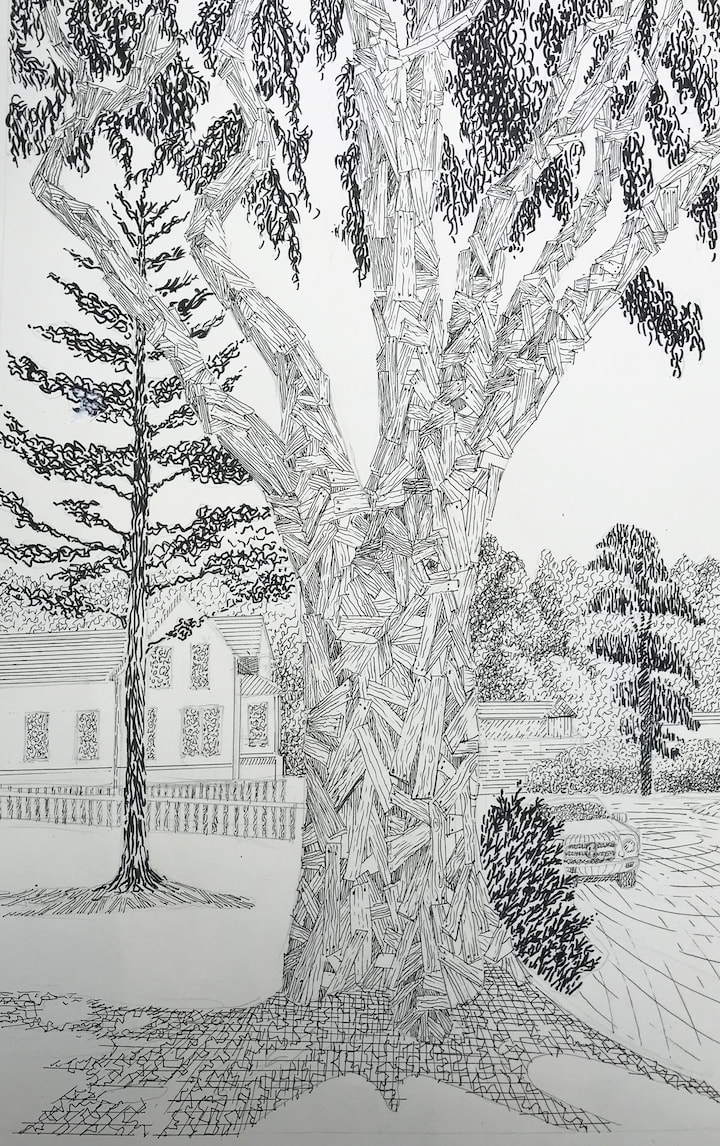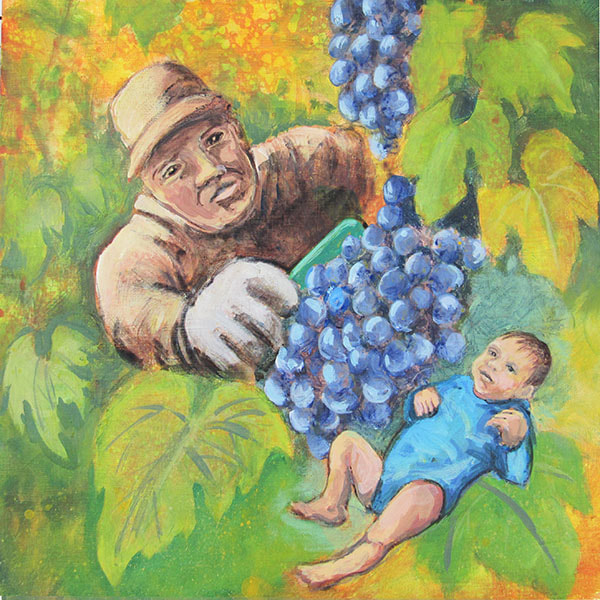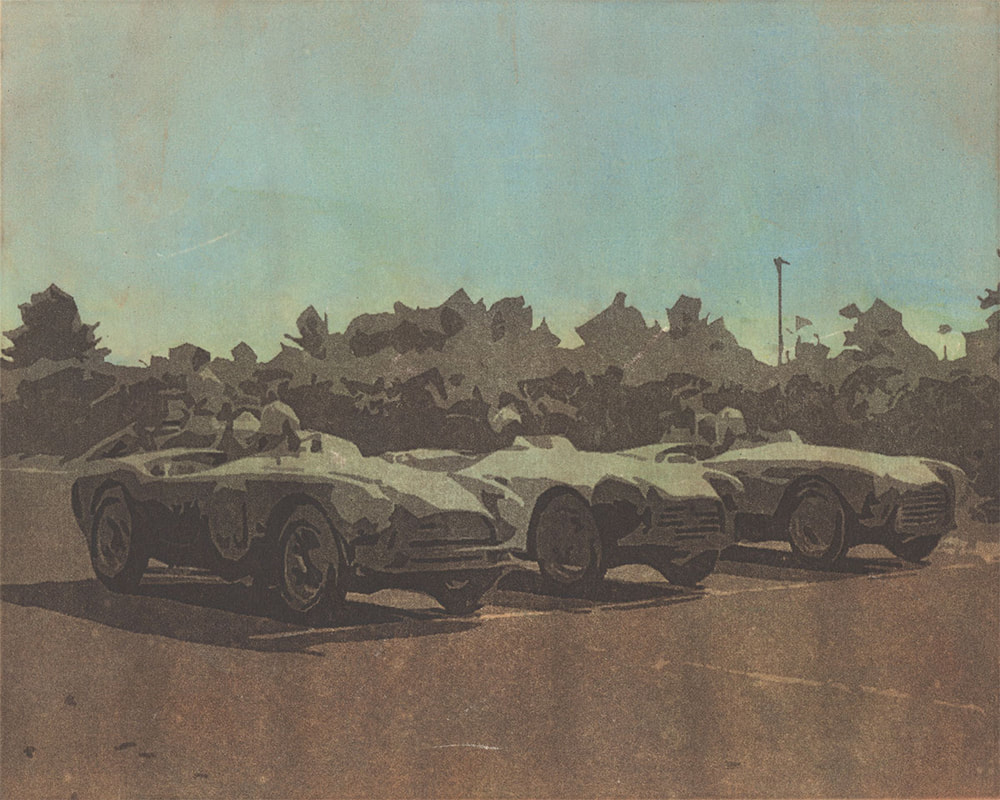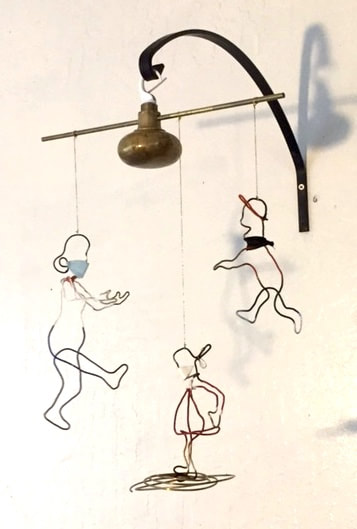Ekphrasis X 2021 Virtual Exhibition
SET 6. Writer Initiators and their Visual Artist Responders, cont.
R. EARLENE GLEISNER, Complaint of a Redwood Tree. Response by ROBERT RHOADES: Return to Standing
S. KATHERINE BROWN, Baby's Bed. Response by artist LAURA CORBEN: Bitter Harvest
T. LES CIZEK, The Choice. Response by artist KATHY CARL: Another Story
U. SUE GIBSON, Potty Time. Response by sculptor PAT SCOTT: It's the Door Knob's Fault, 3D mixed media.
SET 6. Writer Initiators and their Visual Artist Responders, cont.
R. EARLENE GLEISNER, Complaint of a Redwood Tree. Response by ROBERT RHOADES: Return to Standing
S. KATHERINE BROWN, Baby's Bed. Response by artist LAURA CORBEN: Bitter Harvest
T. LES CIZEK, The Choice. Response by artist KATHY CARL: Another Story
U. SUE GIBSON, Potty Time. Response by sculptor PAT SCOTT: It's the Door Knob's Fault, 3D mixed media.
|
Initiation author EARLENE GLEISNER:
Complaint of a Redwood Tree I was meant to stand into the sky, To capture the fog and the wind, embrace them - Bring the waters into my core, Stand firm against the gusts to protect Life on the land. I was meant to be with others of my kind, To communicate and nurture Through our shared roots. I was meant to live into centuries, Not crashed to the ground, sawed apart, Nailed back together into another form, As a deck or shingles or a shed. I was meant to preserve The Earth at my feet, Keep the terrain intact. I was not meant to be taken for another purpose, Leaving the soil naked To wash away in every rainfall, Tumble into once pristine waters. I was meant to be here forever, Not just as a memory in picture books, Read by children who face their days Trying to survive In a wasteland. |
Response by ROBERT RHOADES:
Return to Standing, pen and ink. |
Initiating author KATHERINE HEIMANN BROWN: Baby's Bed.
|
The new season meant hands extended toward heaven, like niños attempting to make designs in blue sand. Their noses would be full of the aroma of manzanas. Much better than their sweat. After the picking, the owners would let them return for the culls and Isabelle would make applesauce for little Felipe.
Pablo would arrive shortly. Manual offered to drive them north with their few belongings. The new house wouldn’t be much bigger, but the only furniture she and Pablo owned consisted of a lamp and Felipe’s baby bed. No. They wouldn’t need much room. In the kitchen, she packed their son’s bottles and the bent aluminum pot. Of course, she still breast fed him, but he also needed water and juice and mashed fruit and cereal. In the bedroom, she gathered her dress, skirt, four tops, two pairs of pants, and her sandals. She folded them neatly into a large trash bag. Pablo already wore his shorts and work boots. She folded his two pairs of pants and two shirts. |
At least they would not pick Fresno’s grapes anymore, where the powder fell on their hands like yellow dust and ground into their clothes and nails. When she and Pablo brushed back their hair, it would leave a streak like a shock of gray.
Maybe in Washington Pablo would find another job, like at Cisnero’s Market, where he would only stock shelves and greet people. Pablo meant amigo. It suited him. No one could resist his gentle voice and smile. Maybe he would go to school, finish his GED, and go on to take college classes. He would need to provide for Felipe because Felipe would not provide for himself. Isabelle returned to the kitchen to check her son where she had rolled his crib next to the window. It was not her and Pablo’s fault, but it was. Felipe continued to sleep in his world of angels and innocence. Too soon he would know otherwise about the poison on the grapes. Too soon he would learn he would never need a bigger bed, even when a man. |
Response by artist LAURA CORBEN: Bitter Harvest
Initiating author LES CIZEK: The Choice.
|
In 1956, my father had no idea I raced a British sports car or performed in community theater. He had placed me in the D.C. branch of the insurance brokerage he ran from Manhattan, and as far as he knew, insurance was my life. Until one morning on his daily commute from Connecticut, when his seat-mate said, “I see your kid won another one.” My father was too much of a snob to read the sports pages, and when he discovered I spent my idle hours racing an A C Bristol around Virginia and Maryland, he ordered me to meet him the next day for lunch in D.C.
Across the table, he studied me with displeasure. “You have a choice, son. You can either be a real American, or you can continue this sports car, play-acting silliness. Which is it going to be? This was my father, the man I most admired, the man whose approval I longed for. “I want to be a real American,” I said. He leaned over the table. “Good choice. This is what we’re going to do. I’m transferring you to our new office in Miami. I want you to find a nice American girl, someone who can entertain clients, and marry her. Take up tennis and golf. Get yourself a nice American car.” |
I nodded without realizing I was making a choice that would shape the next 20 years of my life. I moved in January 1957, met my wife in February, and married her in June. We honeymooned in Havana, and in March 1958 she gave birth to the first of our five children.
I did my best to become the man my father described. The insurance business went well: 45% of the time, I was bored, 45% of the time I was terrified, and 10% of the time (entertaining clients in posh London restaurants, and taking fancy trips to Latin America) I was happy. We built a nice house with a tennis court. On weekends, I fished Biscayne Bay in my skiff and played golf with clients. My wife was a great mother and a talented hostess of dinner parties. When my father visited, he smiled his approval. I had become the good American businessman he wanted, and too busy to ask myself if this was the life I wanted. Until my father died. On the plane home from his funeral, I felt overwhelmed by emotions I could not describe, feelings that would turn my good life upside down. But that’s another story. |
Response by artist KATHY CARL: Another Story, solarplate monoprint.
|
Artist's statement: I stylized a photo of AC Bristol racing cars, hoping to present a dreamlike image for this story. We may never know if the paths we did not choose in life would have been better than the ones we did. Sometimes the dream never dies because it was never chased and possibly lost.
|
Initiating author SUE GIBSON: Potty Time.
|
Kindergarten bathrooms aren’t pleasant places. Little kids like to wait until the very last minute, rush in from the play yard and pee all over the floor. At the end of the day, you pray for an early visit from the janitor. Then you don’t need a gas mask to make your lesson plans. The first day of school is traumatic for Kindergarteners. Away from mama and so many new things to do, it’s scary. One first day, Mary Elisabeth stood in front of the girl’s bathroom door and wept big salty tears. Her big blue eyes swam with embarrassment “Oh, teacher. I don’t know what to do. I am so sorry I wet my pants. I don’t know what to do now. I had to go real bad but the door was closed and mama said to never touch the door knob on a toilet door. She said there’s germs everywhere and I could get sick. The door was closed and I peed my pants. That horrid Raymond saw me and told everyone and I know they’ll call me nasty names. I hate him.” |
I had a stash of extra clothes for such occasions and got her tidied and dry. I also had a long talk with Raymond about being kind. We were experiencing a drought and as all the little kids sat on the rug in front of me in my rocking chair, I said, “You have home work. We are trying to save water. Ask your mama and daddy what you are doing to save water at your house. Tomorrow we’ll share and learn from each other.” The next day at sharing time, I asked about the water at their homes. All sorts of answers, and then there was a prize winner. Lester joined in with, “My mama says that if I have to go big poopie to go next door and flush their toilet.” They don’t teach this stuff in college. |
Response by sculptor PAT SCOTT: The Doorknob's Fault, 3D mixed media mobile




